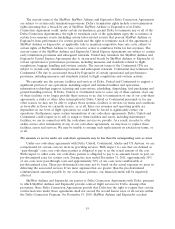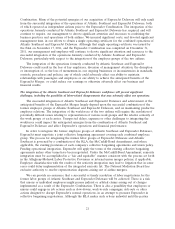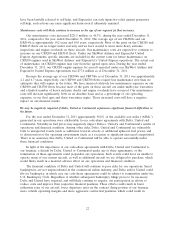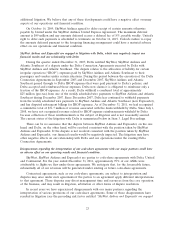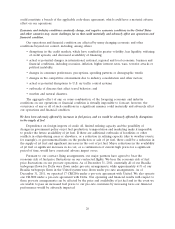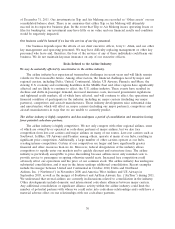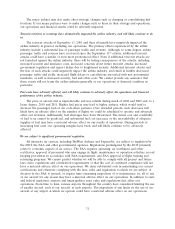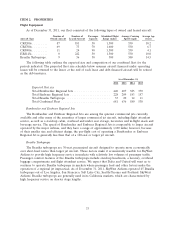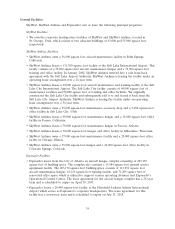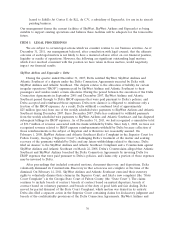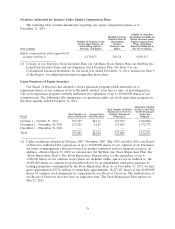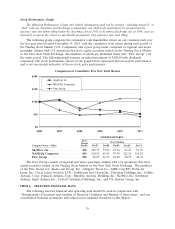SkyWest Airlines 2011 Annual Report Download - page 33
Download and view the complete annual report
Please find page 33 of the 2011 SkyWest Airlines annual report below. You can navigate through the pages in the report by either clicking on the pages listed below, or by using the keyword search tool below to find specific information within the annual report.outbreaks or potential outbreaks of other diseases, such as avian flu. Any outbreak of a disease
(including a worsening of the outbreak of the H1N1 flu virus) that affects travel behavior could have a
material adverse impact on our operating results and financial condition. In addition, outbreaks of
disease could result in quarantines of our personnel or an inability to access facilities or our aircraft,
which could adversely affect our operations and financial condition.
Interruptions or disruptions in service at one of our hub airports, due to adverse weather or for any other
reason, could have a material adverse impact on our operations.
We currently operate primarily through hubs in Atlanta, Los Angeles, Houston, Minneapolis,
Detroit, San Francisco, Salt Lake City, Chicago, Denver, Cincinnati/Northern Kentucky, Houston,
Washington, D.C., Newark, Cleveland and the Pacific Northwest. Nearly all of our flights either
originate from or fly into one of these hubs. Our revenues depend primarily on our completion of
flights and secondarily on service factors such as timeliness of departure and arrival. Any interruptions
or disruptions could, therefore, severely and adversely affect us. Extreme weather can cause flight
disruptions, and during periods of storms or adverse weather, fog, low temperatures, etc., our flights
may be canceled or significantly delayed. Hurricanes Katrina and Rita, in particular, caused severe
disruption to air travel in the affected areas and adversely affected airlines operating in the region,
including ExpressJet. We operate a significant number of flights to and from airports with particular
weather difficulties, including Atlanta, Salt Lake City, Chicago, Newark and Denver. A significant
interruption or disruption in service at one of our hubs, due to adverse weather or otherwise, could
result in the cancellation or delay of a significant portion of our flights and, as a result, could have a
severe adverse impact on our, operations and financial performance.
We are increasingly dependent on technology, and if our technology fails or we are unable to continue to invest
in new technology, our business may be adversely affected.
We have become increasingly dependent on technology initiatives to reduce costs and to enhance
customer service in order to compete in the current business environment. The performance and
reliability of our technology are critical to our ability to compete effectively. Technology initiatives will
continue to require significant capital investments in order to deliver these expected benefits. If we are
unable to make these investments, our business and operations could be negatively affected. In
addition, we may face challenges associated with integrating complex technology systems formerly
operated by Atlantic Southeast and ExpressJet Delaware. If we are unable to manage these challenges
effectively, our business and operations could be negatively affected.
In addition, any internal technological error or failure or large scale external interruption in the
technology infrastructure we depend on, such as power, telecommunications or the internet, may
disrupt our internal network. Any individual, sustained or repeated failure of technology could impact
our customer service and result in increased costs. Like most companies, our technology systems and
related data may be vulnerable to a variety of sources of interruption due to events beyond our control,
including natural disasters, terrorist attacks, telecommunications failures, computer viruses, hackers and
other security issues. While we have in place, and continue to invest in, technology security initiatives
and disaster recovery plans, these measures may not be adequate or implemented properly to prevent a
business disruption and mitigate the resulting adverse financial consequences.
Our investment in foreign airlines may negatively impact our profitability.
On September 4, 2008, we announced our intention to acquire a 20% interest in a Brazilian
regional airline, Trip Linhas Aereas (‘‘Trip’’), for $30 million. As of December 31, 2011, we had an
investment balance of $28.5 million in Trip, which represents a 20% interest in Trip. On September 29,
2010, we acquired a 30% ownership interest in Mekong Aviation Joint Stock Company, an airline
operating in Vietnam (‘‘Air Mekong’’), we had an investment balance of $2.9 million in Air Mekong as
29


